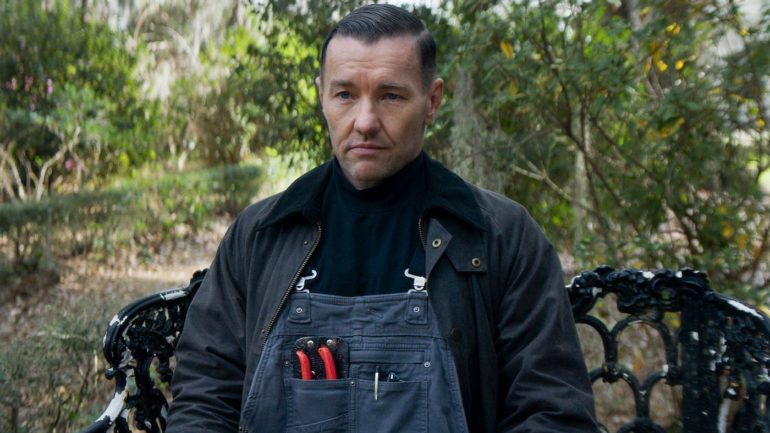As a hobby, isn’t gardening supposed to calm you? It certainly seems to have calmed the soul of Narvel Roth (Joel Edgerton), a man with a murky past trying to live a quieter life, despite some baser impulses. Paul Schrader is back, with another journey in the footsteps of one of God’s lonely men, praise be.
Even though Schrader has spent most of his career exploring the psyches of dangerous solitary men, Master Gardener can’t help but feel like the final chapter of a trilogy. Like Roth, the protagonists of First Reformed and The Card Counter are defined by their isolation, their attempts to journal their insecurities, and their penchant for whiskey. Both previous films asked interesting questions about their clashing desires and their unorthodox methods, but Master Gardener may be the most challenging of the three, at once smaller in scale and offering less concrete answers. This ain’t no walk in the garden.
Like Ethan Hawke’s priest Toller, and Oscar Isaac’s cardsharp Tell, Edgerton’s Roth is dedicated to his chosen profession. Before his newfound career in cultivation, Roth engaged in more destructive extracurricular activity, namely as a member of a Neo-Nazi domestic terrorist group. The evolution of Schrader’s critique of American militarism has been bracing to watch over this unofficial trilogy. From Toller’s disenchanted former army chaplain, to Tell’s vengeance-fuelled disgraced soldier, the monopoly of violence invested in the military has been corrupted at best. Roth is on another level, perpetually trying to make amends for the brand of violence of which he was a part. Schrader and DoP Alex Dynan’s camera stalks Roth and his co-workers around the extensive gardens he manages, trapping him in a maze. His role as gardener is a choice borne of necessity; as well as providing some calm, this is a front for Narvel’s life in Witness Protection following his informing on his terrorist pals of old (Presumably his new name is a joke on the authorities’ part). After a day in the garden, he sits to journal his thoughts with a tumbler of bourbon and gravelly narration. If a self-aware sense of déjà-vu creeps in at this point, you’d be forgiven for thinking Schrader was resting on his laurels. Swap Roth’s gardening manuals for Thomas Merton or Marcus Aurelius, and it could be a carbon copy of similar scenes in the trilogy. But there’s a pointed anger at work here, and it manifests itself in the two women who come to sow the seeds of disaster and/or redemption.
Plants don’t talk back or make demands, but the people that own them sure can. Roth is in the employ of Miss Haverhill, played by Sigourney Weaver and named to evoke memories of another spitefully lonely spinster. With Weaver tearing into her role’s sour dialogue with relish, Haverhill holds a sickly power over Roth, fulfilling demands beyond his remit as gardener. Her latest demand is that he take on her grand-niece Maya (Quintessa Swindell) as his apprentice. Haverhill sees a wayward child in her college dropout grand-niece, but Roth finds therein a rebuke of all the order he has crafted in his garden and his life. This much younger biracial woman, with her ‘Good vibes only’ t-shirt and a dangerous past of her own, offers Roth so much, maybe too much. Schrader blurs the lines of similar relationships in his past films, allowing this one to become sexual and romantic when good taste would dictate otherwise. Though Maya boasts similarities to other opportunities for salvation in Schrader’s work (Think Iris in Taxi Driver, or Cirk in The Card Counter), the complexity offered by Schrader’s script and Swindell’s fiery performance feed into the increased sense of ambiguity in Master Gardener, at least compared to its predecessors. Where Toller and Tell sought to right wrongs inflicted on the world and those that inhabit it, Roth’s actions walk a line between self-preservation and self-aggrandisation. In that sense, while Roth is another of Schrader’s isolated males, this need to both confront, and extricate himself from his past probably has most in common with Yukio Mishima. While this isn’t A Life In Four Chapters, Roth is the most self-contained of Schrader’s recent protagonists, and perhaps the most dangerous. Edgerton delivers his best performance yet, fronting a steely stoicism and tired drawl to mask layers of joy and compassion that few would want to accord a man with a swastika still tattooed on his back.
Master Gardener is a confrontational little flick, at once quiet in approach, but vicious in what it has to say. Even compared to his previous two films, Schrader’s approach feels purposefully abrasive. It may confound, it could offend, but that’s the film’s prerogative. Master Gardener is a real rose: delicate, but thorny. Grapple with it at your peril, and savour it.

